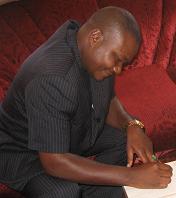 |
| Pamson Dagyat |
Students are aware that the community will look at them expectantly when they pass out of school. The formation of student unions is to provide them with a platform on which they can nurse their leadership skills and be able to live up to the expectations of the community. The National Union of Berom Students (NUBES) National Veterinary Research Institute (NVRI) Vom branch is not different. On the October 25, the National Association of Berom Students organized an award and cultural day festival during which they honoured nine Berom sons.
The organization of cultural days and award presentation ceremonies is one of the activities student unions perform. The activities nonetheless have significance to their respective communities. The purpose of a cultural day is necessitated by the threat of western culture on all other cultures including Africa’s. Thus the cultural day was also aimed at fortification of the Berom culture in view of the threat of extinction, which it also faces. Hence there were people dressed in the traditional Berom attires. Typical Berom traditional meals were also served. There were also Berom traditional dances to entertain all present.
The Berom people make up one of the most populous tribes in Plateau State, occupying three of the seventeen local government areas of the state. These three local governments of Jos-South, Riyom and Barkin Ladi happened to form the most developed, urbanized and economically strongest parts of Plateau State. In view of these opportunities the Berom people feel there shouldn’t be poverty among their people but the reverse is the case. Thus a paper that was delivered during the occasion traced the root of the problem to the inability of the Berom people to embrace western education fully. This, the paper stressed, is connected to the fact that majority of the people were blinded by the abundance of the mineral deposits in the land.
The fellow tribesmen honoured are people who have made the Berom proud by distinguished performance in various spheres of human endevour. They include Honourable Emmanuel Danboyi, a member of the Plateau State House of Assembly, Da Gregory Pam Pwojok, the Dagwon Kwata Zawan and Da Choji Balak, the Da Gwon Rwei of Vwang. Others include Amos Dauda Gwom, Reverend Canon Dalyop Gyang Mang, Pam Gabriel Dagyat, Coach Peter Gyang and Tobias Choji
To Honourable Emmanuel Danboyi, the award ceremony is significant because it afforded the elders being hounoured the opportunity to meet with the students and encourage them and the community at large. In an era where people can only forge ahead when they have the relevant education, it will indeed be wrong of any elder to shun an invitation from the age bracket that have often been scolded for refusing to embrace education. When the youths continue to get educated there will be that assurance of continuity for the tribe they originate from. The tribe will in turn be able to move on in a world of competition.
Honourable Danboyi agrees that the Government of Plateau State is determined to change the fortunes of the state for good. It has support but not as much as it should be he said. Thus he uses any slight opportunity to address a crowd to solicit for support for the government.
All members of the Plateau State House of Assembly recently visited Germany. Honourable Danboyi also used the opportunity to talk to the people on lessons the members learnt during the visit. Danboyi said they were led to German schools to see the kind of attention the Germans attach to education. He says it has served as an inspiration and he would use his position as member of the Plateau State House of Assembly to press for changes in the sector in Plateau State. Danboyi also talked about the fact that they were lead to the House of a royal king that was renovated at the cost of eighty million Euros. That to him is a reflection of the significance the Germans attach to their traditional rulers. He called on the people of Plateau State to attach the same significance to their own traditional rulers in view of the obvious role they play as anchors of peace and the custodians of the tradition of the people.












